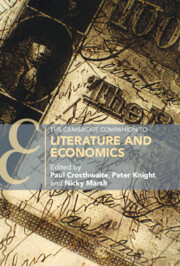Book contents
- The Cambridge Companion to Literature and Economics
- The Cambridge Companion to Literature and Economics
- Copyright page
- Contents
- Contributors
- Introduction
- Part I Histories and Critical Traditions
- Part II Contemporary Critical Perspectives
- Chapter 8 The Economy of Race
- Chapter 9 American Literature and the Fiction of Corporate Personhood
- Chapter 10 Political Economy, the Family, and Sexuality
- Chapter 11 The Literary Marketplace and the Rise of Neoliberalism
- Chapter 12 World-Systems and Literary Studies
- Chapter 13 Crisis, Labor, and the Contemporary
- Chapter 14 Speculative Fiction and Post-Capitalist Speculative Economies: Blueprints and Critiques
- Part III Interdisciplinary Exchanges
- Further Reading
- Index
- Cambridge Companions To …
Chapter 13 - Crisis, Labor, and the Contemporary
from Part II - Contemporary Critical Perspectives
Published online by Cambridge University Press: 28 July 2022
- The Cambridge Companion to Literature and Economics
- The Cambridge Companion to Literature and Economics
- Copyright page
- Contents
- Contributors
- Introduction
- Part I Histories and Critical Traditions
- Part II Contemporary Critical Perspectives
- Chapter 8 The Economy of Race
- Chapter 9 American Literature and the Fiction of Corporate Personhood
- Chapter 10 Political Economy, the Family, and Sexuality
- Chapter 11 The Literary Marketplace and the Rise of Neoliberalism
- Chapter 12 World-Systems and Literary Studies
- Chapter 13 Crisis, Labor, and the Contemporary
- Chapter 14 Speculative Fiction and Post-Capitalist Speculative Economies: Blueprints and Critiques
- Part III Interdisciplinary Exchanges
- Further Reading
- Index
- Cambridge Companions To …
Summary
This chapter considers the difficulty that economics has found in defining labor as a practice separate from its product. Looking first at classical and Marxist economics, it uses feminist economics to highlight the omissions that conventional definitions of labor contain, especially concerning the work of women. By comparing feminist economics with recent novels by women, including Halle Butler’s The New Me (2019), Alice Furse’s Everybody Knows This Is Nowhere (2014), Heike Geissler’s Seasonal Associate (2014), Hilary Leichter’s Temporary (2020), and Ling Ma’s Severance (2018), it argues that contemporary fiction has been attentive to the same omissions. Through a reading of the techniques of literary fiction, including realism and a range of experimental narrative devices, the chapter proposes that the contemporary novel offers kinds of writing that expand our conception of labor. Contemporary fiction contains narratives that highlight the work of social reproduction as a central component of the economies of labor and offer a wider critique of economic categories of value.
- Type
- Chapter
- Information
- The Cambridge Companion to Literature and Economics , pp. 212 - 226Publisher: Cambridge University PressPrint publication year: 2022
- 1
- Cited by

